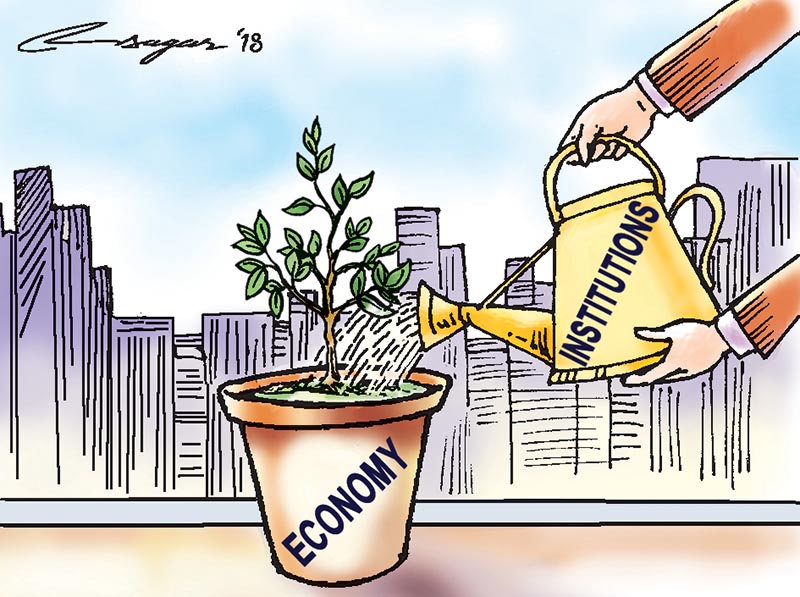Economic growth: Role of institutions
For Nepal to receive and properly utilise development assistance and investment, good governance is a must. Similarly, for more foreign direct investment to pour into the country, we have to ensure investment-friendly environment
Political culture, political system, policies, rules and regulations and social norms and values are considered economic institutions. These are the most important factors on which economic development of a country relies. In general, natural resources, human resources, capital and technology and entrepreneurship are inevitable resources for development. In fact, these resources are insufficient for economic development in under-developed countries (UDCs).
Any kind of resources can be borrowed from abroad, but institutions cannot be transferred. In developed countries, resources are utilised to optimum level because they have proper institutions in place.
In UDCs, natural resources seem to going to a waste. Some are exported but the quantity of natural resources utilised within the country is quite small. Similarly, most labour forces are unemployed, few are sent for foreign jobs and remaining are engaged in domestic jobs which in general are less productive and workers are underpaid.
Like in other UDCs, Nepal is also facing shortfalls in capital, technologies and entrepreneurship.
We have plenty of water resources, but more than half of the arable land lacks access to irrigation facility, while more than one third of geography lacks electricity. Likewise, 2 per cent of youths are unemployed and 30 per cent are semi-employed, according to the Central Bureau of Statistics (CBS).
Globalisation has opened the door for all kinds of resources to get in and out of the country. Investors from all over the world are interested to invest in Nepal in various sectors such as hydropower, cement, mining and natural gases. Besides, they are also interested in consumer items such as liquor, tobacco, cooking oil, fast foods, cleaning utility as well as herbal and allopathic medicines. As of now, there are only a handful of multinationals that are doing well in Nepal. Ncell, Unilever Nepal, Dabur Nepal, Surya Nepal and Bottlers Nepal are some of the big foreign investments in Nepal.
Nepali people’s purchasing power is not that bad. Per capita income of Nepalis in purchasing power parity (PPP) adjusted with GDP is $3,000 while per capita income in real GDP is $1,004, according to the latest CBS forecast. Close to one million tourists visit Nepal annually. But still, Nepal is an import-dominated economy. Nepal has been receiving foreign aid for the last six decades or so. Despite donor agencies promising aid in huge amounts every year, it is not getting materialised due to various reasons.
For Nepal to receive and properly utilise development assistance, good governance is a must. Similarly, for more foreign direct investment to pour into the country, we have to ensure investment-friendly environment. Many UDCs including Nepal have neither good governance nor investment-friendly environment.
Nepal was ranked 122nd among 175 countries in the 2017 Corruption Perception Index of Transparency International. According to the 2017 World Bank annual ratings, Nepal was ranked 105th among 190 countries in the ease of doing business index.
Nepal does lack capital and technologies, but it may not matter a lot if we can strengthen our institutions.
There are examples around the world where countries have managed to make good economic progress in the last four-five decades by strengthening their institutions. South Korea was weaker than us until 1973. It received $13 billion in foreign aid until the late 90s. But it became a donor country in 1996.
Nepal has ample opportunities to boost economic development though. Current account is fully convertible, which means there are no restrictions in exchanging foreign currencies to import or export goods and services. However capital account is not fully convertible – foreign exchanges can enter in almost all areas, and there is flexibility of repatriation as per foreign investment and technology transfer act 1993 (last amendment in 2008).
To protect business intellectual property rights, Nepal has implemented patent, design and trademark act 1965 (last amendment in 2005). If intellectual property is protected, foreign investors are more willing to invest. However, our rules, regulations and laws have not been timely updated.
The Department of Commerce has been given power to enforce property rights. However, it is a lengthy process and takes a lot of time to file a case and get justice. To ensure quick decision-making process, public accountability, transparency and client-oriented services, Good Governance Act 2007 was issued. This law clearly defines the role of elected officials and selected officials. However, the enforcement part has been weak.
Despite investors considering Nepal a favourable country to invest, there are some constraints.
While functional economic institutions spur economic development, blunt ones stymie it. Conducive institutions ensure greater self-expression, allow free flow of information and encourage formation of good associations and clubs, allow greater sharing of resources and reduce the risk attached to economic activity.
Public agencies, trade unions, community structures and professional associations must work in tandem to create a favourable environment for investment so as to ensure rapid economic development.






